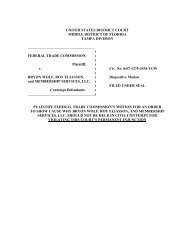Complaint Counsel's Post Trial Brief - Federal Trade Commission
Complaint Counsel's Post Trial Brief - Federal Trade Commission
Complaint Counsel's Post Trial Brief - Federal Trade Commission
You also want an ePaper? Increase the reach of your titles
YUMPU automatically turns print PDFs into web optimized ePapers that Google loves.
not cure the fact that the claims are not substantiated." Dietary Supplements Guide at 24<br />
(quoting "Example 34").<br />
B. Respondents' Representations That The DCO Products Prevent, Treat, or<br />
Cure Cancer Are Misleading<br />
1. Unsubstantiated Claims Are Misleadig<br />
The Commssion may prove an adverisement is deceptive or misleading by showing that<br />
an express or implied claim is false, or by showing that a clai is unsubstantiated because<br />
Respondents lacked a reasonable basis for assering that the clai was tre. FTC v. Pantron I<br />
Corp., 33 F.3d 1088, 1096 (9th Cir. 1994); FTC v. Sabal, 32 F. Supp. 2d 1004, 1007 (N.D. ilL.<br />
1998). Proof of intent to deceive is not required, and ''te subjective good faith of the adverser<br />
is not a valid defense to an enforcement action brought under section 5(a)." Sabal, 32 F. at<br />
1007; see also FTC v. World Travel Vacation Brolærs, Inc., 861 F.2d 1020, 1029 (7th Cir. 1988).<br />
The "reasonable basis" test is an objective standard. Adverisers must possess at least the<br />
level of substantiation expressly or impliedly claied in the adverisement. See Honeywell, Inc.,<br />
126 F.T.C. 202 (1998); FTC v. Natural Solution, Inc., No. CV 06-6112-JFW, 2007 U.S. Dist.<br />
LEXIS 60783, at *10 (C.D. Cal. Aug. 7,2007) (citing FTC<br />
v. U.S. Sales Corp., 785 F. Supp.<br />
737, 748 (N.D. ilL. 1992)). The Commssion has the burden of provig that Respondents'<br />
purorted substantiation is inadequate, but is not required to conduct or present clincal studies<br />
showing that the products do not perorm as claimed. See FTC v. QT, Inc., 448 F. Supp. 2d 908,<br />
959 (N.D. ilL. 2006) ajfd 512 F.3d 858 (7th Cir. 2008), (citing Sabal, 32 F. Supp. 2d at 1008-09).<br />
For health and safety claims, adverisers must possess "competent and reliable scientific<br />
evidence" substantiating their claims in order to have a "reasonable basis" for such claims. See<br />
FTCv. National Urological Group, Inc., No. 1:04-CV-3294-CAP, 2008 U.S. Dist. LEXIS<br />
21

















